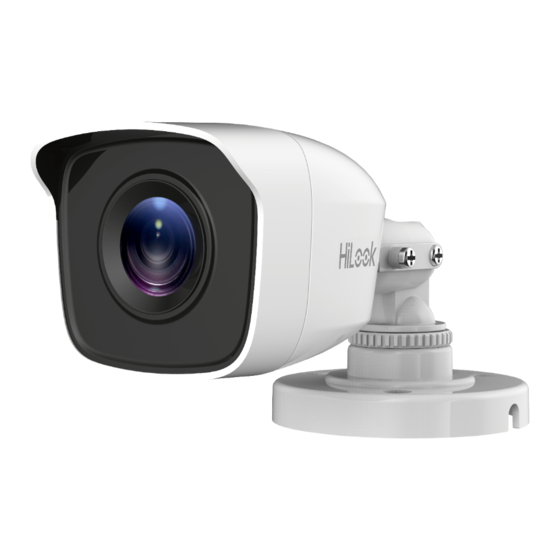
Table of Contents
Advertisement
Quick Links
User Manual
Thank you for purchasing our product. If there are any
questions, or requests, do not hesitate to contact the
dealer.
This manual applies to the models below:
Type
Type I Camera
Type II Camera
Type III Camera
Type IV Camera
This manual may contain several technical incorrect
places or printing errors, and the content is subject to
change without notice. The updates will be added to
the new version of this manual. We will readily improve
or update the products or procedures described in the
manual.
HD Turret and Bullet
Camera
User Manual
Model
HWT-T223-M
HWT-T123-M
HWT-B123-M
HWT-B223-M
0100001080803
Advertisement
Table of Contents

Subscribe to Our Youtube Channel
Summary of Contents for HIKVISION HWT-B123-M
- Page 1 Type I Camera HWT-T223-M Type II Camera HWT-T123-M Type III Camera HWT-B123-M Type IV Camera HWT-B223-M This manual may contain several technical incorrect places or printing errors, and the content is subject to change without notice. The updates will be added to the new version of this manual.
-
Page 2: Regulatory Information
Regulatory Information FCC Information Please take attention that changes or modification not expressly approved by the party responsible for compliance could void the user’s authority to operate the equipment. FCC compliance: This equipment has been tested and found to comply with the limits for a Class A digital device, pursuant to part 15 of the FCC Rules. - Page 3 Safety Instruction These instructions are intended to ensure that user can use the product correctly to avoid danger or property loss. The precaution measure is divided into “Warnings” and “Cautions”. Warnings: Serious injury or death may occur if any of the warnings are neglected.
-
Page 4: Product Features
To avoid heat accumulation, good ventilation is required for the operating environment. Keep the camera away from liquid while in use for non-water-proof device. While in delivery, the camera shall be packed in its original packing, or packing of the same texture. Mark Description Table 0-1 Mark Description Mark... - Page 5 Note: Press and hold the switch button for 5 seconds to switch the video output. Four kinds of video outputs are available: TVI, AHD, CVI, and CVBS. 1.2.3 Overview of Type III Camera Switch Button Mounting Base Power Cord DC12V 12 VDC Video Cable Main Body...
-
Page 6: Installation
2 Installation Before you start: Make sure that the device in the package is in good condition and all the assembly parts are included. Make sure that all the related equipment is power-off during the installation. Check the specification of the products for the ... - Page 7 Figure 2-3 Attach the Camera to the Ceiling Note: The supplied screw package contains self-tapping screws, and expansion bolts. For cement ceiling, expansion bolts are required to fix the camera. For wooden ceiling, self-tapping screws are required. 4. Route the cables through the cable hole, or the side opening.
- Page 8 Figure 2-6 Disassemble the Camera 2. Paste the drill template (supplied) to the place where you want to install the camera. 3. Drill the screw holes and the cable hole (optional) on the ceiling according to the drill template. Figure 2-7 Drill Template Note: Drill the cable hole, when adopting the ceiling outlet to route the cable...
- Page 9 8. Power on the camera to check whether the image on the monitor is gotten from the optimum angle. If not, adjust the camera according to the figure below to get an optimum angle. Pan Position [0° to 360°] Tilt Position [0°...
-
Page 10: Menu Description
Figure 2-12 Fix the Camera to the Ceiling Note: The supplied screw package contains self-tapping screws, and expansion bolts. For cement ceiling, expansion bolts are required to fix the camera. For wooden ceiling, self-tapping screws are required. 4. Route the cables through the cable hole, or the side opening. -
Page 11: Video Format
2. Power on the analog camera, TVI DVR, and the monitor to view the image on the monitor. 3. Click PTZ Control to enter the PTZ Control interface. 4. Call the camera menu by clicking button, or call the preset No. 95. VIDEO FORMAT GLOBAL... - Page 12 BLC (Backlight Compensation) BLC (Backlight Compensation) compensates light to the object in the front to make it clear, but this may cause the over-exposure of the background where the light is strong. WDR (Wide Dynamic Range) The wide dynamic range helps the camera provide clear images even under backlight circumstances.
-
Page 13: Video Settings
LEVEL The LEVEL value can be adjusted from 0 to 3. The greater the value is, the more obvious effects are. D-N THRESHOLD ((Day to Night Threshold) Day to Night Threshold is used to control the sensitivity of switching the day mode to the night mode. You can set the value from 1 to 9. -
Page 14: Slow Shutter
AGC (Auto Gain Control) It optimizes the clarity of the image in poor light conditions. The AGC level can be set as HIGH, MEDIUM, or LOW. Note: The noise will be amplified when setting the AGC level. The higher the level is, the more obvious the noise is. SLOW SHUTTER SLOW SHUTTER increases the exposure time on a single frame, which makes the camera more sensitive to the...













Need help?
Do you have a question about the HWT-B123-M and is the answer not in the manual?
Questions and answers